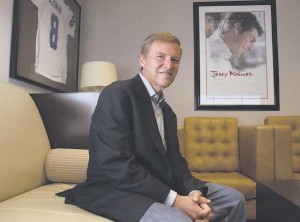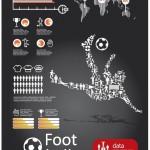Guest post submitted by Lucas Biebelberg
 Today, one of the greatest sports agents in history, Leigh Steinberg, was incredibly gracious in allowing me to interview him for Sports Networker.
Today, one of the greatest sports agents in history, Leigh Steinberg, was incredibly gracious in allowing me to interview him for Sports Networker.
Leigh is the founder and CEO of Steinberg Sports & Entertainment, and has represented athletes such as Steve Young, Troy Aikman, Warren Moon, Bruce Smith, Ben Roethlisberger, Howie Long, Eric Karros, Dusty Baker, Lennox Lewis, and many more. Leigh is credited as being the inspiration for the film, “Jerry Maguire,” and is incredibly well-known throughout the sports industry.
Leigh attended UCLA for a year, followed by UC-Berkley, and then attended law school at Berkeley’s Boalt Hall School of Law. It was there that Leigh met his first NFL client, Steve Bartkowski, and represented him in the NFL Draft, helping him obtain the #1 overall pick. Throughout his career, Leigh has represented more than five 1st overall picks in the NFL.
Leigh has been featured on national television programs such as “60 Minutes,” “Larry King Live,” “The Today Show” and in magazines such as Business Week, Sports Illustrated, ESPN the Magazine, People, Success, Forbes, Playboy and GQ. He also wrote a best-selling book with Michael D’Orso, “Winning with Integrity: Getting What You Want Without Selling Your Soul”, published by Three Rivers Press in October 1999.
Leigh Steinberg Discusses His Life as a Sports Super Agent
During the interview, Leigh and I discussed:
- How he was able to rise to the top as one of the most successful agents in history
- The role the NFL should be taking with regards to concussions for current and retired players
- Leigh’s role with the Sporting Green Alliance
- The path Leigh believes aspiring sports business professionals should take
Leigh Steinberg Video Transcription
Lucas Biebelberg: Hello everyone and thank you very much for joining us today on sportsnetworker.com. Today I’m very honored and humbled to be joined by one of the greatest and most successful sports agents of all time, Mr. Leigh Steinberg – Founder and CEO of Steinberg Sports & Entertainment. Leigh, how are you today?
Leigh Steinberg: Great and I’m glad to be on your show.
Lucas Biebelberg: Great well let’s dive right in here and ask you the very first question we have for you today. There are many different agents today in the business of sports. How were you able to rise to the top as one of the most successful in history?
Leigh Steinberg: I think it’s key to have a philosophy in terms of how to approach athletes. My dad had two core values: one was to treasure relationships, especially family, and the other was to try to make an impact in the world and to help people who couldn’t help themselves, so what’s key is that we have a philosophy that athletes can serve as role models, and they can re-trace their roots to the high school, collegiate, and professional community and set up programs and enhance the quality of life. If they start out with good fundamental values and a sense of self-respect, living in a family where people care for each other while being part of a community where people care for each other, those values will stand the test of time. So, I look for athletes that are bright, that have a sense of how they can use sports as a springboard to a second career, and really the product of our practice is athletes who are successful and what impact we can make together on the world. So, we have 100 high school scholarship funds, at the collegiate level, players like Edgerrin James at the University of Miami or Kelly Collins at Penn State or Eric Karros and Troy Aikman at UCLA, have all endowed full scholarships. At the pro level, it can be programs like Homes for the Holidays, or down payments given to single mothers that moves them into their first home they’ve ever owned, and then someone like Home Depot outfits it. So we ask athletes to put on a board the leading business people, political leadership, and community leadership, which is a resource for them. And while they are doing these programs, it’s giving them a sense to escape from self-absorption and see themselves as active citizens, and it lays the basis for a second career. So, I think its having a philosophy and having the type of athletes who appreciates that and trying to stay true to that.
Lucas Biebelberg: Piggybacking off of what you just said about being a role model, you yourself are a role model because you’ve taken up a very active role with the impact of concussions with the NFL. Now, you’ve been around the NFL for quite some time, my question for you is how much do you think the league should be held accountable for the recent discussions on concussions in the NFL?
Leigh Steinberg: I think if you take the period prior to 2006, there was very little knowledge, awareness, certainly no warning to players. I became concerned back in the late 1980’s when I had clients like Troy Aikman and Steve Young who were suffering from multiple concussions. When we would ask doctors what the long-term impact of these head injuries were, how many were too many, they didn’t have answers. Now, one of the developments was that the brain was less frontier with medical research, so we understand in the last ten years more than probably in whole 130 thousand year history in the human race. But the second key is that we held concussion awareness conferences. Three in Newport Beach in the 90’s, and then again starting in 2006 with the leading neurologist and head-injury specialist from around the league. And, at that point, we had the goods. It turned out that three or more concussions were incredibly harmful, and there are people like Robert Hovda from Boston University, and there were series of neurologists from across the country who had state of the art tests that finally had been done. And what they showed was that, more or less, three seemed to be the magic number. When a player suffers more, indications show that there are exponentially higher rates of Alzheimer’s, premature senility, Parkinson’s, and greatly elevated rates of depression. So, at that point, I called it a ticking time bomb and an undiagnosed health epidemic. And those results were taken to Roger Goodell, and he instituted the first whistle blower edict, where they asked players to report other players, and a physician’s conference. And to their credit, they mandated base-line testing, that is a cognitive test given prior to play, that then is compared when a head injury occurs, to the initial results and you can measure how much degradation of the faculties there has been, and make sure the player is asymptotic at rest on an exercise cycle at practice before going back into a game, and that stops secondary concussion syndrome. The problem is athletic denial. These are people who have been taught since pop-warner and little league to ignore pain, to be stoic, to be part of the unit. And, long-term health is an abstraction. I fear, because the athletes are bigger, stronger, and faster than ever before that the simple physics of the hit has changed. And, if you just take the simple act of an offensive line and defensive line hitting together, it produces a low-level concussive result. The problem with that is that a concussion is not being knocked out. That’s one form, but it’s a blow to the head or body that occasions a larger change in brain function. So if that’s the key, think of an offensive and defensive lineman colliding together, 600 pounds of impact, and those hits accumulating over the course of 70 plays in the game, 20 games in the year, 10 year career, you’re going to have someone with 10,000 hits. And this is a problem not just with the NFL, it’s a problem that any parent needs to consider for their children who play any kind of collusion sports. These hits occur in ASY soccer. Heading the ball produces lower test results in kids. Field hockey, cycling, volleyball, baseball, basketball, football, and on and on, and at all levels. The adolescent brain takes three times longer to recover, so it’s a special risk for adolescence.
Lucas Biebelberg: Thank you for that very detailed answer. I hope that parents will pay closer attention, both at the upper level and younger level, as they allow their kids to participate in contact sports. Another one of your endeavors that you are involved in is with the Sporting Green Alliance, which for those who don’t know, focuses on the sustainability and the lowering of emissions in arenas and stadiums. I’m hoping you can tell me more about how involved you are in that process, and what you hope to accomplish in the near future.
Leigh Steinberg: I became concerned because it seemed to me that our species was in deniable about the immanency of climate change. Oceans are rising, waters are melting on peaks around the world, the water supply is threatened. When the oceans rise, it increases the heat in the environment, and it also changes the quality of life, and dramatic changes are happening. We need to move urgently, or we could be part of the first generation to hand our children a lower quality of life in American history. So I went out and talked to the leaders in the environmental field, Francis Beinecke from Natural Resource Defense Fund, and Matt Paterson, and Debby Levin and Lorie David, to try to get arms around the issue. I ended up speaking at the UN Summit on Sports and the Environment in Losone, Switzerland about five years ago. And what I’ve done is to aggregate a series of sustainable technologies in wind, solar, recycling, resurfacing, and water to take to stadium, arena, and practice fields at the high school, collegiate, and professional level. Now, if you add in golf courses, that’s some series real estate. The key, then, is to incorporate those changes in the venue and the grid, and to try to turn them into energy, provided your selling energy back to the grid. And, to drop carbon emissions as an energy cost, and then to transform those venues into educational platforms so millions of fans that come can see a solar panel for the first time and think about how to incorporate those changes into their own homes and business. So, we put sports in the forefront leading the way. I can envision Saturday morning cartoon shows with sports superheroes fighting for the environment! Sports have such a transformative effect. Role modeling is so important. My dad had another saying: When you look for the “they” in life, the they that’s supposed to fix things. There is no “they.” The “they” is you and the “they” is me.
Lucas Biebelberg: Leigh, the final question we have for you today, is what advice would you give to those aspiring sports business professionals trying to break into the industry today?
Leigh Steinberg: So, lets suppose a student is still in school. I think the key is that they take as much business or practical courses as possible. Athletes don’t necessarily want someone who can recite the 1942 World Series stats, or from the Super Bowl in 1966. They want someone with a skills set that will help enhance them. So, as much business as someone can take, and then go to law school, business school, or even better, a joint degree to pick up more skills. Now, its not that there is a huge amount of law in sports law. The reason that I taught it last year for the first time was there is a about a thimble full of law to it. The point is that those will at least give people the sense that there is value added. Now, my second piece of advice is to think of sports expansively. Instead of just thinking of sports agency, remember that people need help at the league level, team level, university level, conference level, college AD’s; there is a whole field of memorabilia and merchandising that has broken open. Sports television is another massive enterprise, as is sports marketing. The point is to think of all of those, and then there is the ability to intern at certain places and pick up some practical experience. I would do whatever I could to become an intern. If you’re trying to change careers, don’t quit your day job. The economics of sports are like a pyramid: very difficult to break in. But, there are people who hire, and if someone is going to set up their own shop, they need a model, and be aware that different sports are different. The other thing I would tell you, is that what you really need is a commitment to look at an athlete holistically, and the willingness to really care for the athlete. And, an understanding that the role of an agent also involves being a steward of the sport. The real battle in football is not labor vs. management, it’s the battle that the NFL has with the NBA, MLB, NHL, HBO, Walt Disney, and every other form of discretionary entertainment spending. So, if that’s true, the key is to not have the agent’s role, either in individual or collective negotiations, hurt the whole by pushing fans away. What we are looking to do is build the whole, build the pie, cerate ancillary revenue streams. So, I think the right philosophy is also very helpful to get going. Again, there is no one formula. I got lucky. I had the first player in the first round in the NFL draft for my very first contract, which was the very first thing I did in law. That’s just serendipitous. And then what’s needed is a real passion and belief in yourself and ability to help athletes and to help the world. Without that passion, it’s so hyper-competitive that someone will not do the work to break into the field.
Lucas Biebelberg: Leigh, thank you very much for your time today, we greatly appreciate it. It will be beneficial to everyone who watches this video. For sportsnetworker.com, I’m Lucas Biebelberg have a great day.
Leigh Steinberg: Thanks and it was nice being with you!
[/show/hide]
Do you aspire to be a super agent in sports? Let us know what piece of advice from Leigh you found most helpful. Leave a comment below and/or tweet us @sportsnetworker
About the Guest Author
 Lucas Biebelberg is a contributing author to sportsnetworker.com, and a recent Magna Cum Laude graduate of Rutgers University. Along with participating in the Manhattan Sports Business Academy, Lucas is currently interning for 16W Marketing, a talent and event marketing company in Rutherford, NJ. At the conclusion of his internship, Lucas plans on pursuing a career in athlete marketing and sponsorship negotiations. Lucas strongly believes that mentorship is the key to success in any industry, and credits his accomplishments thus far to the three biggest factors involved in his sports endeavors: Lon Rosen, Jason Belzer, Dave Maryles and Ben Sturner. Feel free to connect with Lucas on his twitter, @LucasBiebelberg, or via Linkedin.
Lucas Biebelberg is a contributing author to sportsnetworker.com, and a recent Magna Cum Laude graduate of Rutgers University. Along with participating in the Manhattan Sports Business Academy, Lucas is currently interning for 16W Marketing, a talent and event marketing company in Rutherford, NJ. At the conclusion of his internship, Lucas plans on pursuing a career in athlete marketing and sponsorship negotiations. Lucas strongly believes that mentorship is the key to success in any industry, and credits his accomplishments thus far to the three biggest factors involved in his sports endeavors: Lon Rosen, Jason Belzer, Dave Maryles and Ben Sturner. Feel free to connect with Lucas on his twitter, @LucasBiebelberg, or via Linkedin.




@fieldoo thanks for the RT’s!
thanks for the likes everyone!
Way cool! Some extremely valid points! I appreciate you penning
this write-up plus the rest of the site is really good.
You actually make it appear really easy together with your presentation however I find this topic to be actually one thing which I
feel I’d never understand. It seems too complex and
very huge for me. I’m looking forward for your subsequent post, I’ll attempt to
get the hold of it!
Your article is a shining example of what can Smash Karts be achieved through passion, dedication, and hard work,
Howdy, I accept your blog might have similarity issues with web applications. Without a doubt, since I segregated your site in Safari, very much checked in all situations while opening IE, it covers the issues. I simply trust I give you a solid watch! Close, stunning site!
Many online games require snake io players to plan ahead, think critically, and make quick decisions. By engaging in these activities, players can develop essential skills that are useful in real-world scenarios, like problem-solving and adaptability.
sprunked incredibox is an interactive music creation game where players combine various sound effects and rhythm elements through simple drag-and-drop mechanics to create unique musical pieces.
Your work reflects both brilliance and profound research, making it incredibly valuable. I look forward to reading more of your granny revamp thoughts.